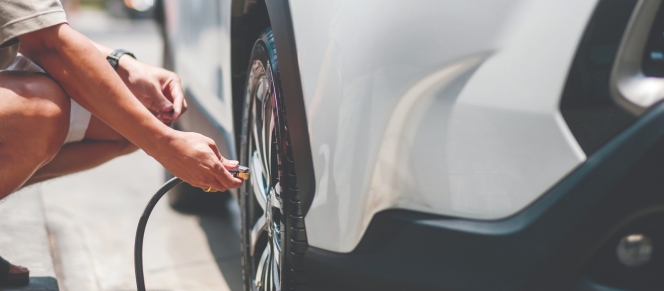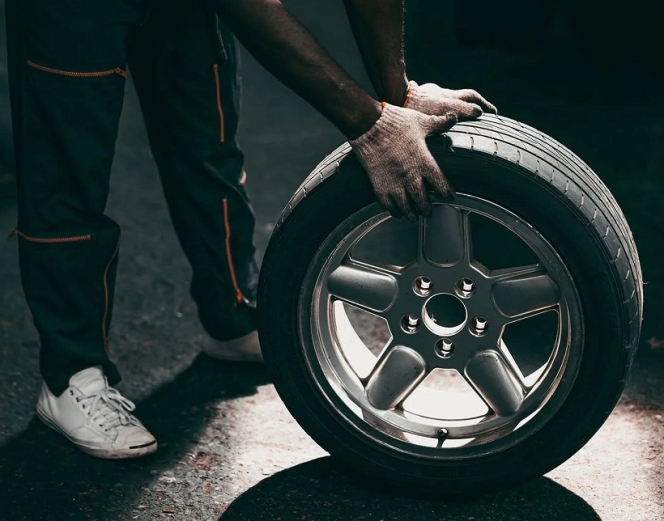Air Way Or The Nitrogen Way?
- By Juili Eklahare
- March 05, 2023

We talk to industry spokespeople and end-users about using nitrogen tyres and air tyres, including their experiences, benefits, myths and more. Read on…
Air tyres are a reality. So are nitrogen tyres. Both have users and suppliers. And many have tried using the two, choosing one over the other. While air tyres are very common, nitrogen tyres are still rolling their way in. Yet there are those who swear by nitrogen tyres and those who could never leave an air tyre’s side.
Benefits experienced from nitrogen tyres
Sneha Phadke, a management generalist based in Pune, India, has been using nitrogen-inflated tyres for the past four years. “When I purchased my two-wheeler, both the tyres were inflated with regular air, which was how I used it for six months. However, a couple of people back then suggested that switching to nitrogen would be more beneficial in terms of the riding experience and prolonging the tyres’ good health,” Phadke recounts, sharing her first-hand experience. “After that, there weren’t frequent punctures, the deflation wasn’t as fast as it happens with regular air, and taking a turn with my two-wheeler is much more comfortable. Air somehow makes the scooter heavier for me to ride – it feels like carrying some extra weight.”
Phadke is of the opinion that as an end-user, there is a significantly distinct experience when one rides a gearless scooter with air-inflated tyres versus a gearless scooter with nitrogen-inflated tyres. However, much did not change in other aspects after moving to nitrogen. For instance, she did not have to invest in extra maintenance for her tyres.
Cost efficiency and trustworthiness
In Phadke’s experience, nitrogen to inflate her scooter’s tyres was easily available to her in Pune. In fact, she already knew four petrol pumps in Pune that provide nitrogen for tyre inflation. “The nitrogen inflation is free. As for the first-time nitrogen inflation, the deflation of air and nitrogen inflation was done at a very nominal cost of INR 20-25 for my scooter,” she says.
Phadke finds it safer to get her tyres inflated with nitrogen at reputed petrol pumps only. This is because she believes that the company staff is properly trained and takes care of all the factors when it comes to checking the tyres and refilling the tyres with nitrogen to the right capacity. “That makes it more cost-efficient, trustworthy and the tyres healthier,” she clarifies. “Plus, the meters at these petrol pumps check the amount of nitrogen in the tyres, which does not give me any reason to doubt the purity of the gas.”
Nitrogen tyres – not for everyone
Like Phadke, Anish Makoday, a BBA student, found the advantage of being able to turn a two-wheeler more smoothly upon switching to nitrogen tyres. “A friend had told me that nitrogen-inflated tyres provide great fuel efficiency. So as petrol prices spiked, I thought that switching to nitrogen would be a good option,” Makoday cites. “Besides, my friends also claimed that nitrogen keeps the tyres cool, and the heat from the road does not affect them much.”
But this was not to last long. “The initial cost for switching to nitrogen (deflation and then inflation) for my scooter was INR 100. I have found the rate of refilling per tyre to differ everywhere, although I have found it to be INR 30-40 at most places,” Makoday informs. “With nitrogen tyres, one does not need to refill their tyres frequently and can refill them twice a month. This led to me often not realising that my tyres were running out of nitrogen and needed refilling. Therefore, I would ride my bike without refilling the tyres for two to three months straight. This resulted in the tyres getting punctured a lot. Unlike nitrogen tyres, regular air tyres require refilling every two weeks, cost up to INR 10 per tyre and one usually tends to refill them immediately once they fill the vehicle’s petrol tank.”
Therefore, Makoday stuck to nitrogen tyres for six months before going back to regular air tyres last year, after facing issues with punctured tyres. Also, he claims that he didn’t experience much difference between the two, except a bit in terms of mileage.
Ikshwaku Deopathak, a musician by profession, too, bid goodbye to nitrogen tyres, one of the reasons being that finding nitrogen stations/pumps was difficult. Nitrogen tyres had also started getting costly for Deopathak. Refilling his car’s tyres with nitrogen cost him a total of INR 200 – that’s INR 50 per tyre. Refilling the tyres with air turned out to be much cheaper, being INR 10 per tyre, he avows.
Access to nitrogen
With the end-users’ different experiences of access to nitrogen for tyre refilling, we ask Amin Almel, CEO, Sunrise Instruments, to throw some light on this aspect. He apprises us that nitrogen refilling options are easily available in cities but can get difficult to access once one heads towards the outskirts and rural areas. “But as petrol pumps are showing up in different parts of the country, nitrogen filling is being made available there,” he states.
Ultimately, one has to take their discipline and riding/driving habits into account when considering moving over to the nitrogen side, Makoday believes. “If one checks and refills their tyres from time to time from the very beginning, unlike me, then nitrogen tyres might be for them,” he states. Sudershan Gusain, Sr DGM Technical Marketing and Standards and Regulations, Bridgestone India, informs that to derive the optimum benefit of nitrogen inflation, the percentage of nitrogen needs to be 95 percent or higher. However, topping up normal air in a nitrogen-inflated tyre once or twice is not known to have any negative impact on tyre life or tyre efficiency.
Nitrogen tyres – a gimmick?
Ravi Chandarana, Co-founder of Kwik Fix Auto, is also one who would not recommend rolling your tyres into the nitrogen territory. “The benefits that people experience through nitrogen tyres are psychological,” Chandarana tells us matter-of-factly. “Nitrogen has been commercialised by tyre shops and petrol stations in the Indian tyre sector. It’s a gimmick; when a tyre shop provides nitrogen for tyre inflation, it advises the end-user to use only nitrogen for their tyres from then on. Thus, the customer tends to keep going back to that respective tyre shop to inflate his/her tyres with nitrogen. That builds the tyre shop’s relation with the customer, and the customer then tends to always remember that particular tyre shop in the back of his/her head. This makes the customer go back to that specific tyre shop a majority of times for tyre inflation and any kind of tyre service.”
Further emphasising his point on how nitrogen is not necessary for tyres, Chandarana highlights that, unlike the availability of air for the same, not every tyre shop and petrol pump out there provides nitrogen for tyre inflation. “That goes to show that not every vehicle tyre is inflated with nitrogen,” he points out. “This further goes on to show that perhaps nitrogen is not that necessary to a tyre – like petrol is to a car. Otherwise, every driver/rider would be using it. If tomorrow nitrogen weren’t available for your tyres, your vehicle would not stop functioning.”
The myths of nitrogen tyres
As it turns out, Chandarana’s Kwik Fix Auto is a tyre dealer and also happens to be a nitrogen supplier for tyres to end-users. But the reason for supplying nitrogen to people’s tyres is solely because there is a demand for it, Chandarana states, but he certainly does not recommend it. He claims that there are several myths related to nitrogen tyres. “For one, people are often told that nitrogen makes their vehicles’ tyres cool. Secondly, it is believed by many that nitrogen tyres would increase their fuel efficiency. However, it’s not really possible to explain this to every customer who comes to me,” Chandarana elucidates.
Another myth related to nitrogen tyres is that once a tyre is inflated with nitrogen, it needs to be refilled with nitrogen alone in the future. Prajakta Jadhav, a teacher trainer who quit nitrogen tyres, claims she was told that inflating with regular air would damage these tyres. Thus, she shares that when she decided to go back to regular air tyres (because nitrogen was expensive for her), she had to wait till her car’s tyres wore out before she could get new ones and inflate them with regular air.
Almel begs to differ with this theory. He clarifies, “If one of your tyres punctures in an emergency situation where you have no access to nitrogen but only air, you can always refill the punctured tyre with air. As long as the pressure is the same, you can drive a vehicle where one tyre may have nitrogen while another may have regular air.”
Digital inflation
Chandarana happens to see one comforting prospect in inflating tyres with nitrogen. That is, nitrogen is inflated into tyres digitally. With digital inflation, one gets the accurate air pressure for their tyres as opposed to analogue meters, which are not properly calibrated, he enlightens.
Using nitrogen tyres in coastal areas
With this one silver lining, Chandarana wouldn’t mind looking favourably on nitrogen tyres, but only from a geographical point of view. He proposes to use nitrogen tyres if one lives in coastal areas. Explaining why, he tells us, “The air in coastal areas is salted. This results in the tyres’ rims getting rusted because of the salted air. In a scenario like this, the nitrogen machine eliminates these gases and inflates the tyres with nitrogen. Otherwise, it doesn’t matter if your tyres have air or nitrogen; what matters is the accurate air pressure.”
Nitrogen quality
In spite of it all, if an end-user still wishes to go for nitrogen tyres (if not living in a coastal area), then it’s important to make sure that the nitrogen is being supplied by a reputed brand,” Chandarana adds. “Secondly, one should make sure that the environment in which the tyre is being inflated has clean air. This is because with polluted air around, one will not get nitrogen of good quality for their tyres.” Gusain adds that using a nitrogen generator to inflate tyres will have better results. “However, the method to inflate is also important,” he says. “If the fitter tops up in a tyre is already inflated with normal air, then that's the wrong way to go. The right way is to deflate the tyre and remove the residual air before inflating it with nitrogen.”
Speaking of nitrogen quality, Basant Nayar, an Associate Director at a financial services firm and who uses nitrogen tyres, always checks the online reviews and ratings of a tyre shop before visiting it. However, Nayar states that one can’t really judge the nitrogen machine.
Tyre tronics to the rescue
While Nayar checks online reviews for the right tyre shop, Karl Pereira, an entrepreneur and nitrogen tyre user, has been refilling his tyres with nitrogen at the same petrol station for the past 17 years. That’s because his car comes with tyre tronics that show the tyres’ pressure and whether the tyres are fine or not. “Once I have refilled my car’s tyres with nitrogen and checked the pressure, I don’t need to refill them for at least a year, or sometimes more, unless the software tells me that there’s something wrong with them,” Pereira tells us.
Why nitrogen tyres matter
Where there’s a demand, there’s supply. And there certainly seems to be a demand for nitrogen in tyres, even if not everyone is opting for it. However, Gusain is of the opinion that choosing between air or nitrogen depends on the need of the consumer and the usage of tyres. Nitrogen has less than half permeability as compared to normal air, which makes nitrogen inflation last longer. However, it is noteworthy that to get the best results, one must continue to inflate at similar frequencies and not have very long gaps.
He further informs, “Nitrogen also has other benefits such as less corrosion of steel wheel and tyre components. In fact, if a commercial truck or bus fleets use retreads, then nitrogen inflation becomes even more important. Besides, it is a more sustainable option as it leads to lesser CO2 emissions. However, it is also the costlier option. So it’s a choice that consumers can make, depending on their preference." Gusain also states that nitrogen inflation is expensive not because of the benefits it offers, but because of the process of using special filters and machines for extraction.
Almel opines that the popularity of the benefits of nitrogen-inflated tyres is being realised by the end-user today. Sunrise Instruments, a manufacturer of nitrogen tyre inflator machines (which act as a filter, separating oxygen and nitrogen), sees clients from tyre shops, petrol stations and dealers from tyre companies like Goodyear, Bridgestone, CEAT and Michelin, Almel tells us. People’s awareness also largely depends on where they choose to inflate their tyres on a regular basis. Well-trained tyre professionals surely educate their customers about the benefits of nitrogen inflation.
Accentuating the expanding market scenario of nitrogen tyres across the world, Almel shares that his company’s nitrogen tyre inflator machines are even exported to UAE and Saudi Arabia. He further points out why nitrogen tyres matter. He posits that being an inert gas, nitrogen does not react. Therefore, there is no reaction with the rubber and metal parts in the tyres. “This extends the tyres’ life,” he goes on to explain. “Additionally, it’s important for the tyre pressure to remain stable as per the vehicle manufacturer’s guideline. This will, in the long run, lead to better fuel mileage, better control of the vehicle and comfort while driving/riding the vehicle. And with nitrogen tyres, the tyre pressure remains stable for a longer period of time, giving you all of this.”
Regular air, on the other hand, contains 21 percent of oxygen, which tends to react and deteriorate the tyre quality, according to Almel. Nitrogen tyres have only 1 percent of other gases and 99 percent of nitrogen itself, which is dry nitrogen.
When asked about the opinion from the other side of the table, Almel avers that if nitrogen hadn’t been important to tyres, then it wouldn’t have been used in aircraft tyres and race car tyres. “And the cars driven on Indian highways are no less than a race car, given their speed,” he puts across. “People have limited time today and are constantly in a rush. These aspects make it important to have nitrogen-inflated tyres in order to have a maintained tyre pressure and to drive safely.”
A subjective choice
Whether a nitrogen tyre works best or an air tyre does, it really comes down to personal experience. Even if not recommended by many, nitrogen tyres do not appear to cause any harm. But our vehicles would be nowhere without tyres (literally), and they certainly are one of the most significant components of our vehicles. If our tyres aren’t right or the pressure has gone wrong, it could endanger a life. Therefore, while one picks a tyre that works best for them, looking at the big picture, it needs to work in every aspect – from cost to convenience to safety. After all, if vehicles can be subjective, why can’t tyres?
Bridgestone And Kwik Fit Renew Live Arena And Supercar Paddock Sponsorship For The British Motor Show 2026
- By TT News
- February 12, 2026

Bridgestone and Kwik Fit are renewing their presence at The British Motor Show for 2026, stepping in as official sponsors of the Live Arena and Supercar Paddock. Their involvement marks the fifth year these two companies have powered some of the event’s most energetic and crowd-drawing features. Central to the show’s appeal, the Live Arena delivers high-octane displays and gripping stunt performances, while the Supercar Paddock offers rare access to an elite collection of supercars. Together, these zones have become defining elements of the visitor experience, reflecting a shared dedication to excitement, engineering excellence and road safety.
Throughout the 2026 event, attendees can look forward to a packed schedule of arena action and an impressive supercar showcase. Bridgestone and Kwik Fit specialists will be present to engage with the public, offering practical advice on tyre care, vehicle checks and overall driver preparedness. This collaboration underscores a sustained alignment between the brands and the show’s mission to inspire and educate automotive enthusiasts of all generations. Scheduled for 21 to 23 August 2026, the show anticipates a significant turnout, presenting an ideal platform for exhibitors and sponsors to engage with both consumers and the broader motoring sector in a direct and meaningful way.

Drew Chapman, Consumer Sales Director, Bridgestone UK, said, “We’re thrilled to return to the British Motor Show with Kwik Fit for our fifth consecutive year. Spanning three exciting days, the event offers a fantastic day out for families and passionate car fans alike. Performance is at the core of everything we do at Bridgestone, so we’re proud to be at the centre of the action as sponsors of the Bridgestone in partnership with Kwik Fit Live Arena and the Supercar Paddock.”
Andy Lane, Marketing Director, Kwik Fit, said, “We’re proud to be partnering with Bridgestone once again at the British Motor Show. The thrilling stunts and extreme performance in the Live Arena and Supercar Paddock may seem a world away from everyday motoring, but there is a common thread. All drivers need to have confidence in their car – whether up on two wheels in the arena or popping to the shops on the road. This event is the perfect place to connect with motorists of all ages and share how our expertise, combined with the quality and performance of Bridgestone tyres, helps keep the nation’s drivers safe on the road.”
Hankook Tire Gears Up For Rally Sweden
- By TT News
- February 11, 2026

Rally Sweden, the only event on the FIA World Rally Championship (WRC) calendar contested entirely on snow and ice, returns to the wintry forests surrounding Umeå from 12 to 15 February. As Round 2 of the 2026 season, it marks the first true winter challenge for Hankook Tire, the championship’s exclusive tyre supplier. With approximately 300 kilometres of special stages divided into 18 high-speed tests, crews will push Rally1 cars to nearly 200 kmph and 8,500 rpm, making precision car control, reliable braking and unerring tyre grip the deciding factors in what has been a WRC fixture since 1950.
For this uniquely demanding environment, Hankook equips competitors with the Winter i*Pike SR10W, a competition tyre engineered specifically for frozen surfaces. Its specially developed ice-rally stud pins and asymmetric tread pattern ensure powerful traction, stable cornering grip and consistent braking on both snow-covered and icy roads. Following a strong debut at the 2025 running of Rally Sweden, where drivers and officials commended its performance, the tyre returns with proven credentials and confidence that it will again meet the extreme demands of the frozen north.
The championship narrative intensifies on home ground for Oliver Solberg. The TOYOTA GAZOO Racing driver arrives in Sweden as the early series leader after his historic victory at Rallye Monte-Carlo, where he became the youngest winner of the event in the 21st century. With momentum and national expectations behind him, the young Swede now aims to extend his title challenge on home snow.
Hankook’s involvement in WRC extends beyond tyre supply. Since becoming the exclusive tyre provider for all classes in 2025, the company has continued to reinforce its global motorsport credentials. By channelling technical insights from more than 70 racing series into product development, Hankook systematically transforms real-world performance data into advancements for ultra-high-performance road tyres, strengthening its technology leadership in both competition and commercial spheres.
Tyres Europe Supports Development Of Enforceable Tyre Abrasion Limits At UNECE
- By TT News
- February 11, 2026

Tyres Europe is actively participating in the UNECE (United Nations Economic Commission for Europe) Working Party on Noise and Tyres (GRBP), where efforts are underway to establish viable tyre abrasion limits. The organisation is contributing to the UNECE Task Force on Tyre Abrasion, which is advancing a proposed Regulation introducing abrasion requirements for type approval. This follows prior agreement on measurement methodologies, with the current focus shifting towards setting specific abrasion limits for passenger car tyres.
By providing ongoing technical input, Tyres Europe aims to support the creation of abrasion rules that are not only ambitious from an environmental standpoint but also practically enforceable. The organisation stresses the importance of globally harmonised standards for tyres, a product traded worldwide, to ensure consistent regulatory compliance and prevent market fragmentation. According to Secretary General Adam McCarthy, well-aligned international rules are also critical for the successful application of the Euro 7 framework within the European Union. Tyres Europe remains committed to contributing to the UNECE work programme to help shape abrasion provisions that can be effectively implemented and progressively refined over time.
Adam McCarthy, Secretary General, Tyres Europe, said, “Reducing tyre abrasion is an important environmental objective and it requires rules that are not only ambitious but also enforceable in practice. For a global product like tyres, globally aligned standards help deliver consistent compliance outcomes and avoid fragmentation across markets. This is also essential to support effective implementation under the Euro 7 framework in the EU.”
ATMA Chair Joins Prime Minister’s Malaysia Delegation
- By TT News
- February 11, 2026

Arun Mammen, chairman of the Automotive Tyre Manufacturers Association (ATMA), was part of the prime minister’s official delegation during a recent visit to Malaysia aimed at strengthening bilateral ties and economic co-operation between the two countries.
The visit provided a platform for engagement between Indian and Malaysian industry leaders across emerging and strategic sectors. Malaysian businesses expressed interest in collaborating with Indian companies in recycling and sustainability, technical textiles, defence components and advanced manufacturing equipment.
During the meetings, Mammen outlined the growth trajectory of the Indian tyre industry, citing rising domestic demand, export potential and an increased focus on innovation, sustainability and circular economy practices.
Industry representatives in Malaysia signalled interest in expanding partnerships, pointing to scope for greater industry-to-industry co-operation in the coming years.







Comments (0)
ADD COMMENT